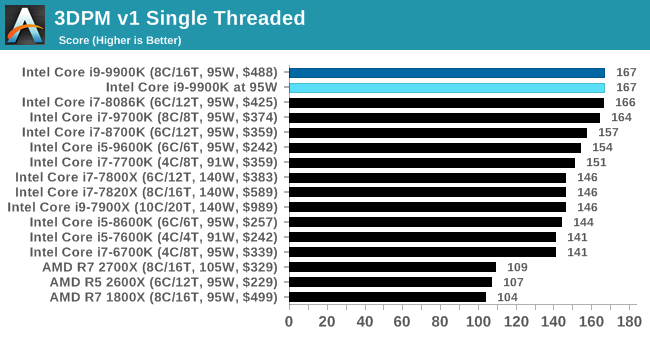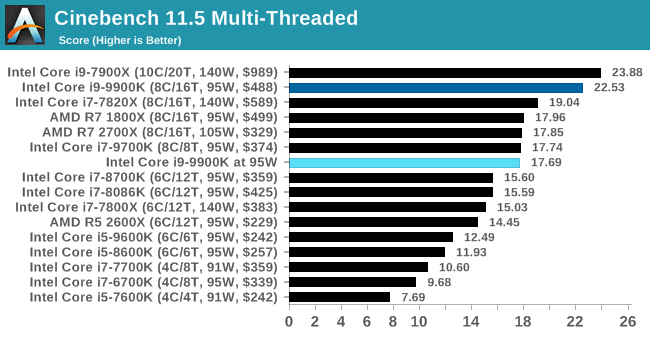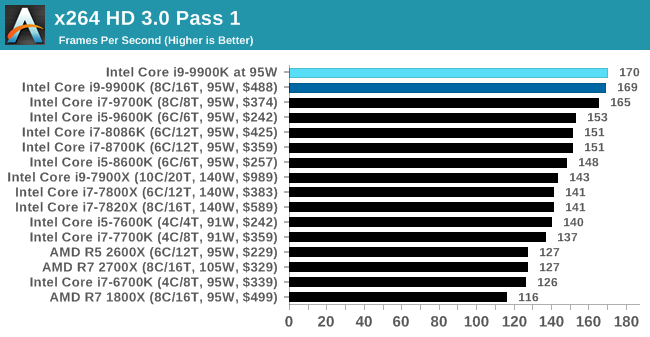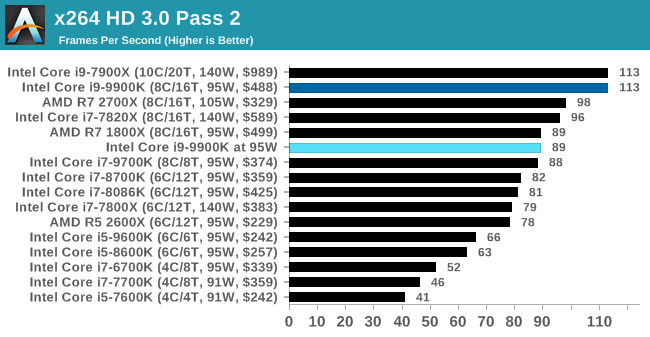The Intel Core i9-9900K at 95W: Fixing The Power for SFF
by Ian Cutress on November 29, 2018 8:00 AM ESTCPU Performance: Legacy Tests
We have also included our legacy benchmarks, representing a stack of older code for popular benchmarks.
All of our benchmark results can also be found in our benchmark engine, Bench.
3DPM v1: Naïve Code Variant of 3DPM v2.1
The first legacy test in the suite is the first version of our 3DPM benchmark. This is the ultimate naïve version of the code, as if it was written by scientist with no knowledge of how computer hardware, compilers, or optimization works (which in fact, it was at the start). This represents a large body of scientific simulation out in the wild, where getting the answer is more important than it being fast (getting a result in 4 days is acceptable if it’s correct, rather than sending someone away for a year to learn to code and getting the result in 5 minutes).
In this version, the only real optimization was in the compiler flags (-O2, -fp:fast), compiling it in release mode, and enabling OpenMP in the main compute loops. The loops were not configured for function size, and one of the key slowdowns is false sharing in the cache. It also has long dependency chains based on the random number generation, which leads to relatively poor performance on specific compute microarchitectures.
3DPM v1 can be downloaded with our 3DPM v2 code here: 3DPMv2.1.rar (13.0 MB)


x264 HD 3.0: Older Transcode Test
This transcoding test is super old, and was used by Anand back in the day of Pentium 4 and Athlon II processors. Here a standardized 720p video is transcoded with a two-pass conversion, with the benchmark showing the frames-per-second of each pass. This benchmark is single-threaded, and between some micro-architectures we seem to actually hit an instructions-per-clock wall.












101 Comments
View All Comments
Hul8 - Friday, November 30, 2018 - link
The fact that all motherboard vendors do the exact same thing could lead one to draw the conclusion that the practice is actually mandated and suggested by Intel - unofficially of course.Higher benchmark results will look good especially for casual readers (who only look at certain performance graphs and skip the power consumption numbers), all the while allowing Intel to market them as "95 W" parts.
Alexvrb - Friday, November 30, 2018 - link
If Intel didn't like this practice they could hardcode behavior in the CPU itself. Oh wait, they DO... and they allow this because it makes them bench better. Meanwhile look at their cheaper locked "95W" models, I bet you won't see them auto-overclocking to 150W+ even with the board defaulting to "unlimited" TDP.Gastec - Wednesday, June 19, 2019 - link
It should be ILLEGAL for motherboard makers to go out of Intel's specifications by default. All overclocking should be entirely the responsibility of the user.rsandru - Thursday, November 29, 2018 - link
It's not capping, it's running the CPU according to the Intel datasheet specification.Operating the component beyond specification is usually called overclocking which is nice and all but doesn't allow an unbiased comparison of the different products.
LTC8K6 - Thursday, November 29, 2018 - link
Why not clamp it to the Intel spec?TheinsanegamerN - Thursday, November 29, 2018 - link
Because motherboards dont do that, they are letting the 9900k run wild.Alexvrb - Friday, November 30, 2018 - link
With Intel's blessing. If Intel wasn't onboard, they'd clamp the behavior on-chip, and you'd have to manually overclock to override TDP for any length of time (for unlocked chips, anyway).Anyway my prediction is that if Intel continues this practice, AMD just starts following suit more and more as time goes on. We'll see.
djayjp - Thursday, November 29, 2018 - link
So many of these tests would run better (faster and with much greater efficiency) on a highly parallel GPU instead.PeachNCream - Thursday, November 29, 2018 - link
You may have missed the point of the article.melgross - Thursday, November 29, 2018 - link
What I find interesting about all of this is that with mobile ARM chips the exact same characteristics are called throttling instead. Possibly we should get these naming conventions together? Either x86 chips throttle, as mobile ARM chips do, or mobile ARM chips have turbo mode too.